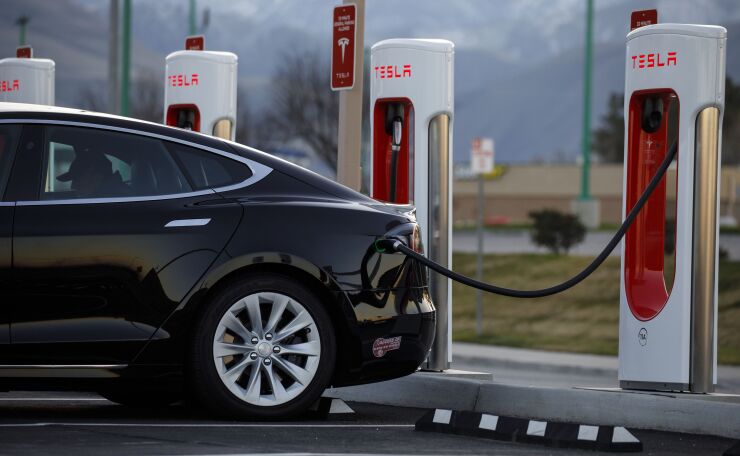With a recognition that climate change needs to be addressed in Florida, a new law aims to create a network of electric and hybrid vehicle charging stations across the state.

Electric vehicles can help decrease these emissions by reducing the impact of climate change on the state, says SB 7018, which was signed into law by Republican Gov. Ron DeSantis June 9.
DeSantis, who was elected in November 2018, has been more open to legislation that addresses climate change than predecessor Rick Scott, who is now a U.S. Senator. Scott, a Republican who was governor for eight years, forbade state agencies to use the term.
Getting the EV infrastructure in place is important, said Kelley Smith Burk, director of the Office of Energy at the Florida Department of Agriculture and Consumer Services, an agency headed by Nikki Fried. Fried is the only Democrat elected to head a statewide government agency.
“Electric vehicles are a critical component to reducing energy consumption, curbing greenhouse gas emissions, and supporting a sustainable transportation system," Burk told The Bond Buyer.
"As home to the state’s Office of Energy, the Florida Department of Agriculture and Consumer Services believes it is vital to provide guidance and information, so the necessary infrastructure can be installed where our consumers will need it most,” she added.
Burk's office is working on an Electric Vehicle Roadmap, examining various issues related to the sector, including its impact on the state's electric grid and best practices for siting EV charging stations.
SB 7018 orders the Florida Department of Transportation to coordinate with the Florida Department of Agriculture and Consumer Services and the Public Service Commission, which regulates investor-owned utilities, to create a master plan for installing EV charging stations along the state highway system.
FDOT will also quantify the loss of revenue to the State Transportation Trust Fund from current and projected future use of EVs, and will study how other states addressed losses due to growth in the industry. The bill doesn't discuss costs or whether the program might be bond-financed, although the agencies working on the plan are allowed to "explore other issues as necessary and appropriate."
Preliminary recommendations must be provided to the governor, the president of the Senate, and the speaker of the House of Representatives by Dec. 1. The final recommended master plan is due by July 1, 2021.
Developing a network of charging stations will "encourage the expansion of electric vehicle use" in Florida, according to SB 7018.
A driver can cover a lot of ground in Florida — it's more than 830 miles from Key West to Pensacola. The charging station plan is expected to include fast charging stations that would make it possible for EVs to be used during evacuations in hurricanes or other disasters. Fast chargers can charge 80% of a car's battery in 30 minutes, according to the ChargePoint Inc.
Since January, state legislatures have approved 13 bills in six states, adding fees and higher fuel taxes that provide an additional $5.1 billion in transportation funds, according to the Transportation Investment Advocacy Center of the American Road and Transportation Builders Association. Some fees were on electric and hybrid vehicles.
In 2019, some 27 states
In Florida this year, two bills addressing fees and grants for EV programs were proposed, but both died in committee.
SB 1230 would have redirected $5 million in nonrecurring funds from the State Transportation Trust Fund for FDOT to implement the Electric Vehicle Infrastructure Grant Program. Grants would have gone to state agencies, public universities, public transit agencies, ports, airports, and local governments to install publicly available EV charging stations.
SB 1346 would have created a license tax, plus an additional flat fee, on low-speed, electric, and plug-in hybrid electric vehicles. The charges varied depending on the weight of the vehicle.
While the bills above didn't pass, the Senate

The infrastructure includes EV charging stations that "will make a cleaner fuel source more readily available."
Florida has more than 83,000 EVs, of which 70,986 are automobiles and pickup trucks, according to the Florida Energy and Climate Plan, Powering Change,
In a 2012 study for the Legislature, the Florida Public Service Commission said there were between 1,000 and 6,000 EVs in the state.
While the 76-page Energy and Climate Plan discusses a number of sectors to be addressed, it also says, "proper infrastructure, including high-speed chargers along evacuation routes is necessary, in case of a hurricane or natural disaster."
SB 7018 also orders the creation of staging areas to keep emergency supplies, equipment and personnel to provide faster assistance to the public in times, for example, when the hurricane-prone state is hit. The staging areas will be placed on the turnpike system, whose capital projects are typically financed with bonds.
In creating the plan for staging areas, the bill directs FDOT to give priority consideration to placing them in the rural counties where three controversial new toll roads will be located in the Multi-use Corridors of Regional Economic Significance program, or M-CORES.
The M-CORES program to build 330-miles of new toll roads was approved by lawmakers and DeSantis last year, an effort championed by Senate President Bill Galvano, R-Bradenton. The program calls for building three new toll roads spanning as many as 21 counties.
Galvano also backed the creation of staging areas in SB 7018, and House Bill 969, which allocates up to $5 million annually from the State Transportation Trust Fund to develop broadband infrastructure in or adjacent to the M-CORES toll roads. The governor signed HB 969 into law on June 9.
“Our state’s infrastructure is at the core of the government's responsibility regarding public safety," Galvano said when the bill was signed. "Expanding fixed broadband in rural areas of our state will help our first responders quickly and accurately reach Floridians in need, while the development of permanent staging areas for emergencies will improve the efficiency of emergency response."
The M-CORES projects constitute the state’s largest new road building project in decades, in addition to one of the largest bond financing programs approved by lawmakers in years. The program was widely supported by the Florida Chamber of Commerce, various transportation companies and builders, who along with Galvano say the roads will be needed to support Florida's growing population.
With 21.47 million people, Florida is the nation’s third-most populous state, trailing only California and Texas, according to the U.S. Census Bureau. Before the COVID-19 pandemic, Galvano said the state gained more than 850 people a day and the new toll roads "will help achieve Florida’s goal of strategically planning for future population growth."
FDOT had not recommended the projects, and they've been panned by environmentalists and planners, who are concerned that they will run through habitat supporting threatened and endangered species, and will lead to sprawl.
The routes are the Suncoast Connector, extending the existing tolled Suncoast Parkway 150 miles north from Citrus County to the Georgia state line; the 40-mile-long Northern Turnpike Connector linking the Suncoast Parkway with Interstate 75; and the Southwest-Central Florida Connector which will span 150 miles from Lakeland to Naples.
Three task forces are meeting to determine the need for the projects, as well as recommending specific routes. Their reports are due to state officials by Oct. 1. The legislation approving the roads says construction is expected to begin no later than Dec. 31, 2022.
If constructed, the three toll roads will be part of the Florida Turnpike Enterprise system, although it is unknown if tolls from the projects will be enough to pay the debt because the state doesn't know how much they will cost or how much they will be traveled. The existing Suncoast Parkway on the west coast of the state has never met travel projections.
Last year, the “No Roads to Ruin Coalition” of 55 organizations and businesses





